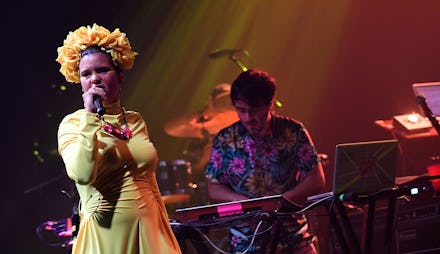Bomba Estéreo on infusing Colombia's nationwide protests with music

For the past few weeks, Colombia has been gripped by national protests, with hundreds of thousands of people taking to the streets to challenge the leadership of President Ivan Duque. Protesters took issue with the country’s lack of investment into public goods and services and the murder of indigenous leaders in the country. Duque, who took office in the summer of 2018, has been criticized for his economic policies, his conservative viewpoints, and the rollback of peace negotiations with the country’s most well-known militia, FARC.
The protests have earned the support of Colombian artists, who joined in the protests in the nation’s capital, Bogota, on Sunday. The electronic pop band Bomba Estéreo was among them. In a phone call with Mic, Bomba Estéreo’s bassist and founder, Simón Mejía, explained why Colombians have taken to the streets, and why he joined them.
“It's happening all over Latin America. It is basically — we as countries, we are tired of politicians,” Mejía explains. “All of these Latin American countries have gone through a very difficult history, with the involvement of politicians and the government regarding poverty, education, and the environment. So It came to a very critical point. People, in general, were tired of that situation and it came to a point that the only way of asking for things was going out to the streets and striking.”
Bomba Estéreo was one of over forty bands to perform in Bogota on Sunday, as part of the protests. As with many other protests that have erupted in Latin America in 2019, a noticeable element of the demonstrations was the music. Whether it is the cacerolazo (the banging on pots and pans), the chanting of an anti-rape song in Chile, or the meeting of thousands of people on a rainy and cloudy afternoon in Colombia’s capital city. For Mejía, the meeting of art and protest comes only naturally. “As a Colombian artist it is organic to express that in the music,” Mejía says.“The Colombian context is a very difficult context. We've been basically in was for the last 100 years. For me, war has been going on in Colombia since colonial times.”
“When you become aware that you have a voice or kind of leadership, know through your artistic voice you feel the responsibility of touching on subjects speaking to the people,” Mejía says.
The band’s involvement in Colombian politics isn’t new. When Duque was sworn into office, Bomba Estéreo released a music video for their song “Amar Asi,” which countered the President’s horrible rhetoric about LGBTQ people. The video depicts two soldiers on falling in love on an island off the coast of Colombia, a visual that subverts the homophobia and machismo perpetuated by Duque’s politics.
But Bomba Estéreo’s main area of advocacy is for the environment. Like in the rest of the world, climate change is posing an urgent threat to Colombia’s ecosystems. Colombia is home to 10% of the Amazon forest, which has been rapidly diminishing as corporate interests have preceded their protection. “The richness that we have here is [the environment],” Mejía says. He explains that the government has prioritized developing the Colombian economy over the protection of the environment.
While other Latin American countries have had large national strikes and protests in the past, Colombia has not had mass mobilizations like the one happening now in decades. Meija, like plenty of other Colombians who have gone out to protest, is hoping this is the beginning of a long and lasting change.
“What's happening today, you didn't see it before in Colombia. We're not like France or those kinds of places that anything that happens, people go out to the streets strike. Colombia was kind of asleep before,” Mejía explains. “I see it as a huge awakening. And as the beginning of a very beautiful process, hopefully, of changing how things work here.”